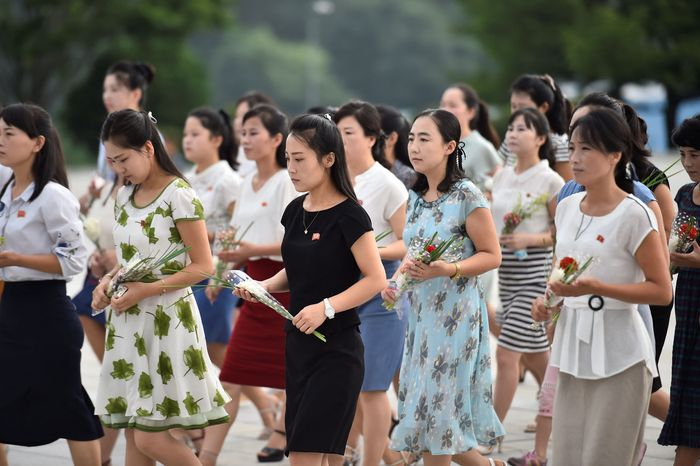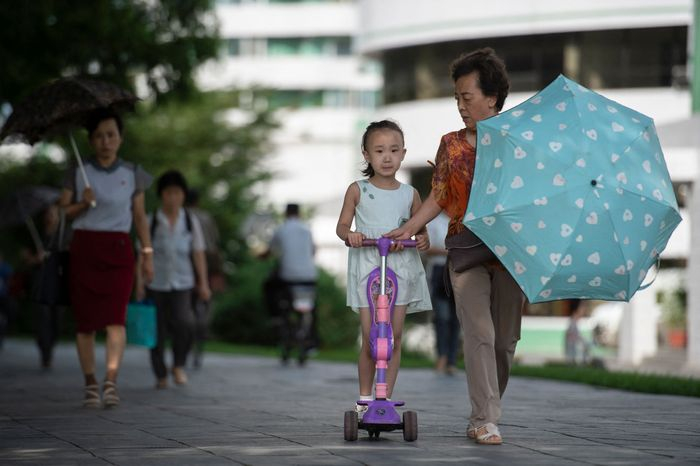Kim Jong Un urges women to be good comrades — and give birth
The North Korean leader voices his first-ever concern over the nation’s declining birthrate
By The Wall Street Journal Dec 07, 2023 (Gmt+09:00)
LG Chem to sell water filter business to Glenwood PE for $692 million


Kyobo Life poised to buy Japan’s SBI Group-owned savings bank


KT&G eyes overseas M&A after rejecting activist fund's offer


StockX in merger talks with Naver’s online reseller Kream


Mirae Asset to be named Korea Post’s core real estate fund operator



SEOUL—Kim Jong Un has a new mission for North Korean women: Have more babies.
Kim acknowledged the impoverished nation’s plunging birthrate for the first time publicly at a rare National Conference of Mothers. Wiping away tears, the 39-year-old dictator, who is a father of three, described mothers as revolutionaries who were on the front lines of rooting out antisocialist behavior and helping the nation prosper.
Households producing “many children” would be given higher priority for housing, food and medical services, as well as unspecified subsidies and preferential treatment, Kim said, according to a Tuesday state-media report.
“When all mothers clearly understand that it is patriotism to give birth to many children and do so positively,” Kim said, “our cause of building a powerful socialist country can be hastened faster.”
Declining birthrates are a problem for many of the world’s wealthiest countries, including the U.S., much of Western Europe and Asia’s most advanced economies. The trend threatens labor forces and government budgets as populations get older and leave fewer working-age people to spur economic growth.
But North Korea’s birthrate—a snapshot of the average number of babies a woman would have over her lifetime—is unusually low for a poor country, standing at 1.6, according to South Korean estimates. That is about half the rate of African countries with a similar economic profile. Countries need fertility rates of around 2.1 to maintain the population, demographic experts say.
North Korea needs a robust population more than other nations. Farming, construction and other projects require significantly more manpower than elsewhere, as sanctions make it difficult to upgrade the country’s infrastructure. North Korea also boasts one of the world’s largest standing armies with more than one million personnel. Historically, many citizens have been dispatched to foreign countries to generate money for the government.
The Kim regime isn’t alone among authoritarian states pushing for more children. In recent months, Chinese leader Xi Jinping urged women to cultivate a “new culture of marriage and childbearing.” Russian President Vladimir Putin called for large families to again become the norm, recalling prior generations where households often had seven or eight children. Over the past decade, Cuba has offered government incentives to convince women to have more babies to reverse its population slide.
North Korea faces some particularly acute challenges to boosting its birthrate. Its economy has suffered under sanctions and isolation during the pandemic. Much of its 26 million population suffers from food shortages and rampant human-rights abuses—especially so for women.
Cases of domestic violence and sexual harassment against North Korean women go virtually unreported, according to Human Rights Watch. Women also face widespread discrimination in the country’s deeply patriarchal society, with their reputations often depending largely on obeying men in the family, the group said.

In his recent speech to mothers, Kim said housewives who promote domestic harmony and manage their family affairs are a great thing for the country. He urged them to become a “meticulous mother, a grateful wife and a kindhearted daughter-in-law.”
Unlike his father and grandfather, Kim has brought the women in his life into the public eye. His sister, Kim Yo Jong, holds a senior Workers’ Party position. His wife is often seen with him in public. And in the past year or so, Kim Jong Un has made frequent appearances with his young daughter.
After the 1950-53 Korean War, North Korea urged citizens to have large families, with twins often appearing in state propaganda. But by the 1980s, North Korea’s state-controlled economy struggled to keep pace with the expanding population and implemented birth-control programs, including contraception, to slow growth. The famine in the ensuing decade further eroded the system of government rationing.
As a result, North Korea’s fertility rate has steadily fallen from about 2.8 in 1979, according to United Nations data.
In recent decades, more North Koreans have turned to smuggling goods or other black-market commerce to survive—with women often serving as a household’s breadwinners, since many young men face decadelong military conscriptions. That has led to the elongated slide in the nation’s birthrate, said Lee Woo-young, a professor of North Korean society and culture at the University of North Korean Studies in Seoul.
“Even though North Korean women gained little equality, their economic participation raised women’s social status and more women began prioritizing making a living over having children,” Lee said.
Women earn more than 70% of household income in North Korea, as traders in the black market, which proliferated following the late 1990s famine, according to the Korea Institute for National Unification, a South Korean think tank. Women also shoulder most of the housework and child care, North Korean defectors say.
Kim’s emphasis on North Korean mothers follows his calls for the country’s youth to reject foreign culture, such as dressing like South Koreans or using South Korean words, which are considered antisocialist behavior. The younger generation’s exposure to foreign culture challenges Kim’s attempt to keep a tight grip on information to maintain loyalty to the regime.
“Unless a mother becomes a communist, it is impossible for her to bring up her sons and daughters as communists and transform the members of her family into revolutionaries,” Kim said at the two-day conference that ended Monday.
Write to Dasl Yoon at dasl.yoon@wsj.com
Appeared in the December 6, 2023, print edition as 'Kim—No Kidding—Calls for a Baby Boom'.
-

-
 EconomySouth Korea to boost aid for chipmakers to $23 billion, expanding extra budget
EconomySouth Korea to boost aid for chipmakers to $23 billion, expanding extra budgetApr 16, 2025 (Gmt+09:00)
-
 AutomobilesSouth Korea announces emergency support for auto sector against US tariffs
AutomobilesSouth Korea announces emergency support for auto sector against US tariffsApr 09, 2025 (Gmt+09:00)
-
 EconomyChina says it is aiming to coordinate tariff response with Japan, South Korea
EconomyChina says it is aiming to coordinate tariff response with Japan, South KoreaApr 02, 2025 (Gmt+09:00)
-



